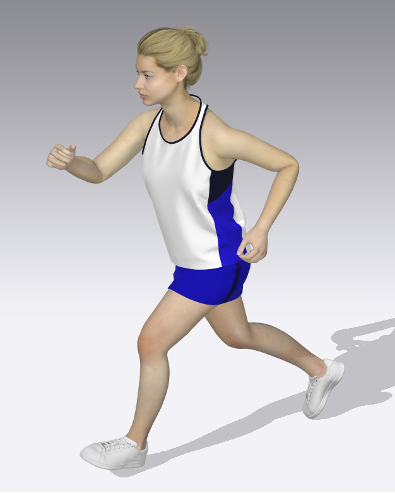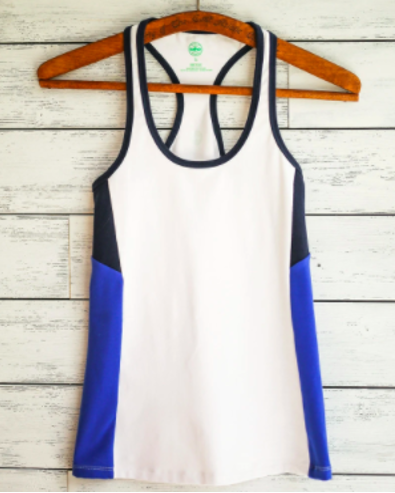
Ryan Teng from CLO Discusses 3D Technology in the Fashion Industry
Ryan Teng, Vice President of Business Development for CLO 3D, spoke to the Retail Management program on September 28th, 2020. CLO 3D is an innovative company that allows users to create 3D fashion designs in real-time. This technology has positive implications in the sustainable retail supply chain and has grown in popularity over the past 10 years in the apparel industry.
First, let's dive deeper into what CLO 3D is. This software allows designers and product developers to see their designs before they ever are put into production. CLO 3D is entirely equipped with virtual avatars in a multitude of size ranges and body shapes. Upon loading an avatar, users can design clothing that will fit that model precisely. Avatars are rigged with full skeletons, so the avatars can walk, change poses, and perform other motions. One immense benefit of CLO is that the garments are made to scale, so everything is created to exact measurements. However, if the user wants to change the size of an avatar or the garment, that is an easy fix on this program.
Next, a bit about Ryan's background: before working at CLO 3D, he had no digital technology background and had not obtained a degree in fashion or retail. His hard work and passion for the company got him hired, where he picked up the skills quickly and was able to rise up the ladder.
Ryan first told students the history of CLO and its sister software called Marvelous Designer that started it all. Marvelous Designer is 3D garment simulation technology used in gaming in film industries that allows for realistic draping on characters. Although not widely accepted initially, Marvelous Designer began working with large animation companies and is even the source of Elsa's famous dress in Frozen. After the success of Marvelous Designer, CLO 3D was created to be the digital fashion companion to Marvelous Designer.
Facing many of the same acceptance issues that Marvelous Designer did initially, CLO 3D is growing more and more in the fashion industry each day. According to Ryan, there are so many different ways to utilize CLO, and each company has its own "secret sauce" to making the software work for their company, which always impressed him.
He has seen CLO 3D be used for realistic 3D fashion design to virtual runway shows. Visual merchandisers can create digital floor plans and digital photoshoots in this software, which is why IKEA is one of their largest clients. Believe it or not, most of IKEA's online catalog is now digitally produced, featuring little to no tangible products.
Ryan explained that one of the goals of CLO 3D is to create a "3D twin" for every garment or fashion product being produced. While they know that is a long-term goal, it is one that they keep pushing for as a company each day.

CLO has pushed for more innovative uses of the software and has even partnered with major companies such as Cotton Incorporated. In August 2020, Cotton Incorporated introduced a 3D digital fabric collection within their well-known FABRICAST™ library. Users are now able to take garment design to the next level through downloadable digital fabric files across a variety of constructions featured in the library.
To learn more about the 3D digital cotton fabrics, visit Cotton Incorporated's CottonWorks™
website.

CLO has also begun working with many other big retail names, and the list is continuing to multiply. They also work with universities and are hoping to develop these skills in students before they enter the workforce. Once enough universities have taught the software, they expect that graduating students will help the technology grow even more once they enter the industry.
After the information session, Ryan opened up the floor for questions. Here is a look at what our students and faculty had to ask:
Q: What are the hesitations retailers have with 3D technology? Why isn't everyone using this right now?
A: "Most companies may have hesitation due to being scared of change or having to deal with a learning curve after years of doing everything by hand. However, especially during COVID-19, companies are starting to see how beneficial this technology is."
Q: How can students build their portfolio to get a job at a company like CLO?
A: Ryan answered, "By showing that they are eternally curious and always want to learn more. Showing a passion for changing the industry is more powerful than the technical skills you may be lacking, because technical skills can be taught."
Q: Do you believe that having this 3D Technology will take away jobs throughout any part of the supply chain in companies who adopt this software?
A: "I do not believe that that will be a problem. If anything, it will help create more jobs by adopting this software, and it will help shape the future of retail and steer us in a new direction full of opportunities and innovations. This technology can save companies time from doing redundant work and, therefore, creates even more time for the job's creative parts."
Q: Do other areas of the production line, like pattern makers, need to implement CLO3D if their designers are using it.
A: They don't have to, and actually, most of them are set in their ways and won't implement a new software like this. They prefer to do things the "old school way" if you will. Designers can give the production line a still of the design from CLO3D as a reference for a final garment.
After hearing what Mr. Teng had to say, here are some of the takeaways of our students:
"It is extremely obvious how beneficial learning CLO-3D is going to be for my career in corporate retail. As Ryan mentioned in his presentation, the future is digital, and I believe that to keep up with innovation, it is up to us as students to learn the software of tomorrow." - Hanna Doerbeck
"I think that learning CLO will teach us how to think outside of the box and build a knack for new technologies. I have learned that being open-minded and flexible will benefit you immensely at the end of the day. I think this technology will inspire us to be more innovative and resourceful in our future career paths. " - Jessica Vice
"I like how he came from a different industry and worked hard to get where he is now. They want us to be curious, daring, and willing to learn about CLO3D and its technology." - Abel Hernandez
"After meeting with Ryan, I became interested in working for CLO. Today, CLO has provided great insight when it comes to shopping online. With the increase of e-commerce, CLO 3D technology can help increase online sales." - Shayna Erskine
The Retail Management program could not be more thankful for the opportunity to work with such an innovative and forward-thinking company. With this new and unique skill set, we cannot wait to see where it takes our students from here.
For more information or questions, please contact Catherine Jai at catherine.jai@ttu.edu.
